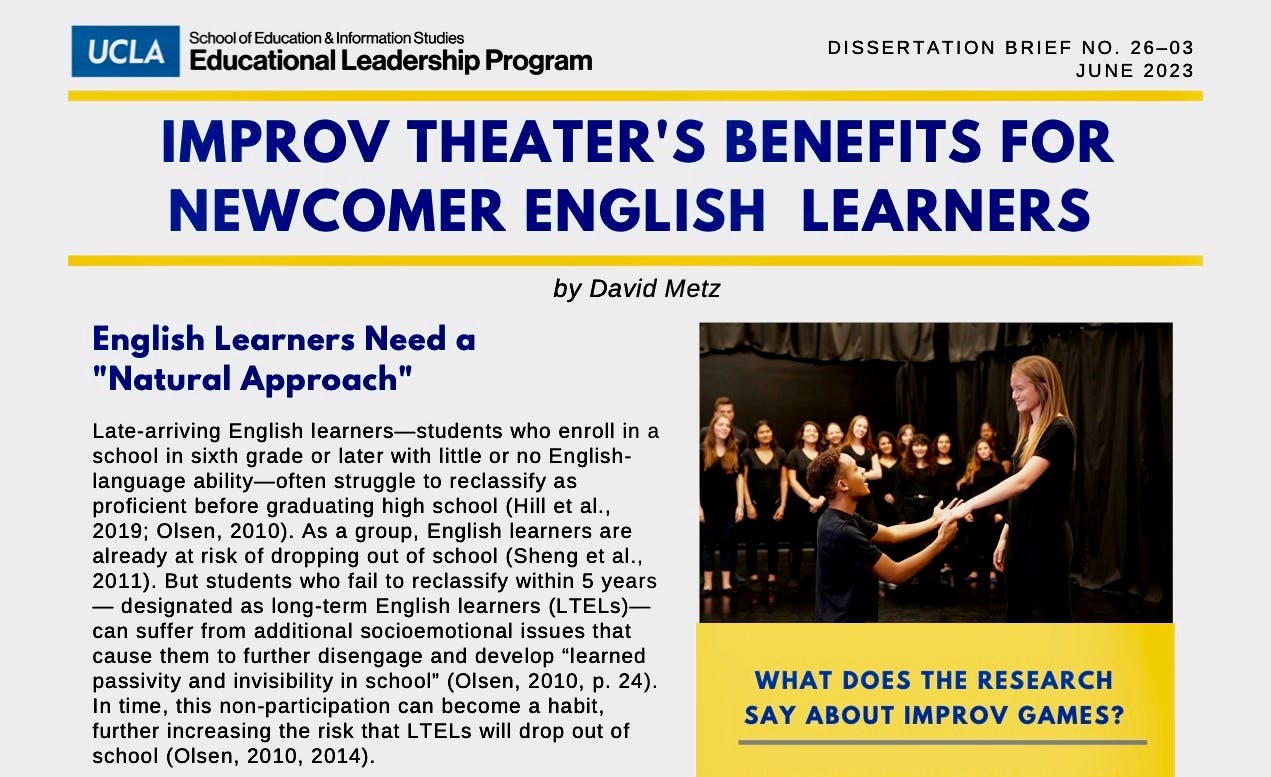Study findings suggest improv’s play-based, spontaneous activities can reduce anxiety and increase engagement among newcomer English-language learner students.

David Metz is a classically trained professional actor. After earning a Bachelor of Fine Arts degree from the Carnegie Mellon School of Drama, he moved to Los Angeles to pursue a career in acting. Before long, he was spending time at The Groundlings, a famed theater and school that for more than 40 years has been training actors and comedians in the art of improv. Its alumni include the likes of Will Ferrell, Melissa McCarthy, and Jennifer Coolidge, among others.
Improv is a spontaneous form of performance where the story, characters, and dialogue are made up on the spot and acted out as the story moves along. As the comedian Tina Fey describes it, “You just say yes and figure it out afterward.” Improv performer and coach Rob Schiffman says, “Improv teaches the importance of support through true listening.”
At Carnegie Mellon, Metz had received a little training in improv, but in Los Angeles, he dove in head first. “I really drank the Kool-Aid. I was smitten with people in the improv world and the dictum of ‘Yes, and…,’ and the ‘I’ve got your back’ stuff,” he says.
Metz was a working actor for about ten years, taking part in theatrical productions and supporting himself doing commercials. A few friends were involved in a non-profit summer program called Voices in Harmony, which was engaging underserved Los Angeles area youth in acting, and Metz volunteered. He and other actors served as acting mentors, working as part of a two-person team—one actor, one student actor—to act a scene custom-written by a professional screenwriter, eventually performing it at what would become the Ricardo Montalbán Theatre on Vine Street in Hollywood.
“It was a transformational experience for me and the students,” Metz says. “When I saw how these kids went from kind of hiding in the corner to standing on stage, with 1,000 kids in the audience cheering for them, man, it was really something.”
Excited by the experience, Metz gradually began to seek out more opportunities to work with kids and even to teach improv. He eventually got a part-time job as a theater arts specialist at the Echo Horizon School in Culver City, helping to mainstream young people who had been deaf but had had their hearing at least partially restored through a cochlear implant procedure.
“These students had to transition from a world of American Sign Language to one which included those who could hear. It’s a cultural thing for kids who are deaf. They have their own language, their own world. And to transition from the world of deaf people into the world of the hearing, or at least to be able to straddle both, for a young person is very challenging,” Metz says.
“I saw it as an opportunity to tinker around and implement improv games as the main structure of the curriculum. It did a lot of the things I felt these kids needed, like creating community between the kids who had just gotten their cochlear implants and the rest of the kids. We were creating a community, creating teams, building trust, lowering anxiety, and all that stuff. These kids were creating. And I was able to help them gain tools and to realize they had tools that maybe they didn’t know about. And these kids, who were new to the hearing world, were able to come on stage and show us so much of what was going on inside them and what was going on in this imaginary world because of their facility with physicality. The kids who had received cochlear implants were excellent teachers when it came to physicality. And I started to see that the students were learning from their peers and that maybe improv was something that seemed to work.”
These experiences would serve as the early seeds of Metz’s interest in and approach to using improv in teaching. Now a full-time teacher in the Los Angeles Unified School District, Metz worked as a theater arts teacher at the Ramón C. Cortines School of Visual and Performing Arts for eight years, and the past year at the Santee Education Complex. And he has continued to use improv as a strategy for working with his students, including those classified as English learners.
Metz’s interest in working with English-learner students stems directly from his experiences with improv.
“I started to realize that the same reasons why improv was so useful with the hard-of-hearing students were the reasons it started to work with newcomer English learners. They needed some other input: pantomime, or what improv practitioners call “space work,” which serves as the building blocks of improv’s imaginary worlds. I found that improv was such a useful tool, it was just a great net to catch them all with.”
There are lots of English learner students in Los Angeles schools, and Metz started working with them at the Ramón C. Cortines School of Visual and Performing Arts. The school agreed to have him implement improv as an enrichment program with the students after school once or twice a week. He started playing theater games with the kids (and provided the ever-popular incentive of hot pizza) and the program evolved into a kind of English learner improv workshop. Eventually, the newcomers in the program would also engage in mask work activities (improvisation using Commedia dell’Arte-style masks) and other things, and as a culmination, put on a show for their parents and classmates.
Metz did that for five years. It was intense and exciting, and he had a sense it was helping students. But he didn’t know how to measure it and always felt like he had a hard time justifying what he was doing to his ever-changing administrators. He knew he needed to do some research, so he applied to the UCLA Educational Leadership Program.
“I knew that this is what I needed to study. I couldn’t figure it out on my own,” Metz says.
Fast forward, and Metz is now a doctoral graduate of the UCLA Educational Leadership Program. His dissertation explored the use of improvisational theater to engage newcomer English learners. Metz recently published a dissertation brief, “Improv Theater’s Benefits for Newcomer English Learners,” as part of the Educational Leadership Program Dissertation Brief series.
Metz’s research adds to what is known about the benefits of the use of improv in education, extending the research to include English-learner students. To Metz’s knowledge, it’s the first study to detail what happens when you do improv with newcomer English learners as a group. The brief highlights the benefits of using improv with English learners, making clear that is it effective in helping to reduce anxiety and encourage engagement. The brief also identifies effective aspects of improv and offers recommendations for practitioners.
To conduct the study, Metz designed and taught a 7-week improv program, whereby he observed and interviewed 11 high school newcomer students enrolled in a sheltered English class. Due to the COVID pandemic, the improv activities were adapted to a format that could be performed on Zoom, as distance learning protocols had been put in place at the time of the study. All students were Latinx, and all but one used Spanish as his primary language (his first was Kʼicheʼ, a Mesoamerican language). The students participated in improv theater activities and recorded their engagement and anxiety levels in a journal. Ten of the eleven students also shared their thoughts in semi-structured exit interviews.
It was just a chance to kind of listen to what these students were saying about their experiences with improv,” Metz says. “I just wanted to know, ‘How does doing improv make you feel?’”
All but one participant in the study reported feeling social anxiety when attempting language tasks, but the improv activities offered a point of entry to all levels of students. Participation in a variety of games and other improv activities helped to reduce their anxiety. One student described the experience as “letting go” of his anxiety. The students pointed to specific ways that the games had an effect, including building group trust, engaging their bodies and redirecting their minds, and allowing them to transition from being spectators to participants.
“English learners or second-language learners are notoriously anxious. The kids were really anxious about speaking English and being made fun of, especially the beginners,” Metz says. “In a way, improv kind of tricks you out of doing certain things, a sort of benevolent manipulator. It’s kind of like magic, a magician is redirecting you, or a good teacher redirecting your attention into something that’s going to take up all your bandwidth so that you don’t have the energy to be worrying about what that guy over there is thinking about you.”
Metz’s research also highlights the effective aspects of improv, underscoring that it is enjoyable and accessible and that it offers opportunities for collaborative learning and numerous points of access to participation. The students also enjoyed and embraced the diversity of games in the improv exercises.
Building on the study’s lessons and his own experiences, Metz strongly encourages educators to try improv activities and offers recommendations for practitioners. Three specific best practices for using improv with English learners emerged from the research, suggesting educators include an array of difficulty levels, employ heterogeneous student grouping, and incorporate reflective journaling. And Metz wants educators to understand that “this improv thing that kids do is really just play; it’s play in its purest sense.” And play he believes, is essential to meaningful learning.
Most importantly, Metz wants educators to try improv with their students.
“If you’re an administrator, reach out to your local improv theater (they frequently have a school) and have someone come and do some professional development with your staff. If you’re a teacher, you can reach out and do that. The LAUSD will even award salary points to teachers to learn improv. There are plenty of resources out there to learn about improv. Go take an improv class and start letting improv build your students’ confidence and unleash their imaginations,” Metz says.
Improv Theater’s Benefits for Newcomer English Learners is part of a series of dissertation briefs published by the UCLA Educational Leadership Program. The full brief, including key findings and recommendations, is available here
